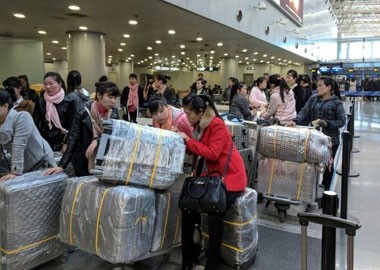North Korean Citizens Travel: Understanding the Realities. Are you curious about the possibility of North Korean citizens traveling abroad? TRAVELS.EDU.VN explores the intricacies of North Korean travel policies and opportunities. This guide offers insights into international travel regulations and restrictions for North Koreans. Discover the realities and possibilities today.
1. Understanding North Korean Travel Policies
North Korean citizens travel abroad under strict regulations. Unlike many countries, leaving North Korea requires government permission. These policies are rooted in the nation’s unique political and social climate, aiming to control the flow of information and ensure loyalty.
1.1. Permission and Exit Stamps
To travel abroad, North Koreans need an exit stamp, similar to what was required in many former socialist countries. This system helps the government monitor and control who leaves the country. When North Koreans travel abroad, they are also required to undergo a re-entrance interview to ensure they have not become influenced by foreign ideologies.
The primary reason for these measures is the state’s investment in citizens’ education. The government wants to ensure that those who travel abroad return and contribute to the country, rather than defecting. The re-entry interview serves as a check against the adoption of capitalist ideals.
 North Korean passport requiring an exit stamp for approved international travel.
North Korean passport requiring an exit stamp for approved international travel.
1.2. Reasons for Approved Travel
North Koreans travel abroad mainly for specific reasons approved by the government. These include:
- Work: Many North Koreans work in other countries to generate income for the state.
- Business: Some travel for trade and business-related activities.
- Study: A number of students are sent abroad to gain knowledge and skills.
- Diplomacy: Government officials and embassy staff reside in various countries.
- Sports: Athletes participate in international competitions.
2. Common Reasons for North Koreans Traveling Abroad
North Koreans travel abroad for various reasons, ranging from employment and education to diplomatic assignments and athletic competitions. Understanding these motivations provides a clearer picture of who gets to leave the country and why.
2.1. Working Abroad
A significant number of North Koreans work abroad in various sectors. These workers contribute financially to the country through their earnings.
- Laborers in Russia: Many North Koreans work in Russia, primarily in construction, logging, and agriculture. These laborers provide a source of foreign income for North Korea.
- Chefs and Waitresses: North Korean restaurants, particularly in China, employ North Korean staff. These restaurants are often seen in cities like Dandong, providing authentic North Korean cuisine.
- Footballers in Foreign Leagues: Some North Korean footballers play in foreign leagues, mainly in Asia and occasionally in Europe. These athletes bring exposure and revenue to their home country.
2.2. Students Abroad
Education is another key reason for North Koreans to travel internationally. Students are often sent to other countries to study subjects that are beneficial to North Korea’s development.
- China: Many North Korean students study in China, focusing on Chinese language, science, and technology. Cities like Beijing, Shenyang, and Yanji have large North Korean student populations.
2.3. Embassies Abroad
North Korea operates nearly 60 overseas missions staffed by North Korean consular personnel. These embassies are crucial for diplomatic relations and provide services to North Korean citizens abroad.
- Locations: North Korean embassies are located in countries such as the United Kingdom, Germany, Italy, Spain, Singapore, and Thailand.
- Services: These embassies handle visa applications, provide assistance to North Korean citizens, and facilitate diplomatic relations.
2.4. North Koreans in New York City
A small group of North Koreans resides in New York City, working at the country’s mission to the United Nations. These individuals are involved in diplomatic activities and represent North Korea on the international stage.
3. Leisure Travel for North Koreans
While not common, North Koreans may sometimes engage in leisure activities while traveling abroad for business or study. These opportunities are usually structured and supervised.
3.1. Combining Business and Leisure
When North Koreans travel for business or study, they may have limited opportunities for leisure. These are often planned as part of the trip.
- Tourism Conferences: Some North Korean officials attending tourism conferences have been known to take short leisure trips. For example, partners from Pyongyang once attended a tourism conference in Hanoi, Vietnam, and took a cruise in Halong Bay.
4. North Korean Athletes on the Global Stage
North Korean athletes have a history of participating in international sports competitions, including the Olympic Games. Their participation showcases the country’s talent and provides opportunities for cultural exchange.
4.1. North Korea at the Olympics
North Korea first participated in the Winter Olympics in 1964 and the Summer Olympics in 1972. They have attended most games since, except for boycotts in 1984 and 1988.
- Joint Marches: In the 2000 and 2004 Olympics, North and South Korean teams marched together during the opening ceremonies, symbolizing unity.
- 2018 Winter Olympics: North Korea sent 22 athletes and a delegation of 400 supporters to the Pyeongchang Winter Olympics in South Korea.
 North and South Korean athletes united during the opening ceremony, symbolizing a moment of unity at the Olympic Games.
North and South Korean athletes united during the opening ceremony, symbolizing a moment of unity at the Olympic Games.
4.2. Prominent Athletes
Several North Korean athletes have gained international recognition for their achievements.
- Ri Myung-Hun: A famous basketball player who played center for North Korea’s national team. At 7’8 ½” tall, he had aspirations to play in the NBA but was unable to due to trade restrictions.
- Han Kwang-Song: A talented football player who played for Cagliari Calcio in Italy’s Serie A. He was the first North Korean to score in Serie A, marking a significant achievement in his career.
 Ri Myung-Hun, a towering figure in North Korean basketball, symbolizing athletic prowess and national pride.
Ri Myung-Hun, a towering figure in North Korean basketball, symbolizing athletic prowess and national pride.
5. North Korean Diaspora
The North Korean diaspora consists of individuals living outside North Korea who maintain ties to their homeland. This group differs from defectors and includes those who can travel back to North Korea.
5.1. Locations and Characteristics
The North Korean diaspora is primarily located in China, Russia, and other former Soviet countries. These individuals have the ability to travel and live abroad while maintaining the option to return to North Korea to visit family.
6. Domestic Travel within North Korea
Yes, North Koreans can travel domestically. The domestic tourism market is growing, with more people exploring their own country. Popular destinations include:
6.1. Popular Destinations
Several locations are favored by North Korean domestic tourists:
- Masikryong Ski Resort: A popular ski resort offering winter sports activities.
- Wonsan Beach: A coastal destination known for its beaches and recreational activities.
- Kumgangsan Mountain Range: A scenic mountain range offering hiking and natural beauty.
- Chilbosan Mountain Range: Another mountain range known for its unique landscapes and hiking trails.
- Mount Paektu: A sacred mountain with significant cultural and historical importance.
- Samjiyon City: A modern city offering various attractions and amenities.
- Yangdok Hot Spring Resort: A resort offering hot springs and relaxation facilities.
7. Defectors and Travel Restrictions
Defectors from North Korea face significant challenges. They often seek refuge in other countries, but if caught, they are typically returned to North Korea.
7.1. The Defection Process
North Korean defectors often escape through China and then seek asylum in countries like Thailand or South Korea. The journey is fraught with danger, and those caught are repatriated.
7.2. Re-Defections
In some cases, North Korean defectors choose to return to North Korea. These “re-defectors” are sometimes welcomed back, though the reasons for their return can vary.
7.3. Restrictions on Return
The ability of North Korean defectors to return home is often restricted by South Korea and other countries. This makes it difficult for defectors to go back even if they change their minds.
8. Impact of COVID-19 on Travel
The COVID-19 pandemic severely restricted travel in and out of North Korea. The country closed its borders, preventing both international and domestic travel.
8.1. Border Closures
From 2020 to 2024, North Korea implemented strict border closures, becoming one of the most isolated countries in the world. This impacted all forms of travel, including North Koreans traveling abroad.
8.2. Limited Reopening
In June 2024, North Korea began to gradually reopen its borders. Commercial routes from Beijing and Vladivostok to Pyongyang were reintroduced, allowing some travel to resume.
9. Current Travel Situation (2024)
As of 2024, North Koreans can travel abroad, but restrictions remain. The reopening of commercial routes has facilitated some travel, but the situation is still evolving.
9.1. Ongoing Restrictions
While travel is possible, COVID-19-related restrictions are still in place. These may include quarantine requirements and health screenings.
9.2. High-Profile Travel
Kim Jong-Un’s recent trip to Russia by train highlights the resumption of international travel for key figures.
10. TRAVELS.EDU.VN: Your Partner in Exploring Global Destinations
While North Korea remains a unique and complex travel destination, TRAVELS.EDU.VN offers a wide range of travel services to destinations around the globe. Our expertise and personalized service ensure a seamless and unforgettable travel experience.
10.1. Why Choose TRAVELS.EDU.VN?
- Expert Guidance: Our experienced travel professionals provide personalized advice and support.
- Customized Itineraries: We tailor travel plans to your specific interests and preferences.
- Reliable Service: We ensure every aspect of your trip is handled with care and attention to detail.
10.2. Contact Us
Ready to plan your next adventure? Contact TRAVELS.EDU.VN today!
- Address: 123 Main St, Napa, CA 94559, United States
- WhatsApp: +1 (707) 257-5400
- Website: TRAVELS.EDU.VN
Don’t wait! Let travels.edu.vn create the perfect travel experience for you. Contact us now to discuss your travel plans and receive a personalized consultation.
FAQ: North Korean Travel
1. Can North Korean citizens freely travel abroad?
No, North Korean citizens cannot freely travel abroad. They require government permission and an exit stamp.
2. What are the main reasons North Koreans travel abroad?
The main reasons include work, business, study, diplomacy, and athletic competitions.
3. Do North Koreans travel abroad for leisure?
It is rare, but sometimes they may engage in leisure activities while traveling for business or study, often as part of a planned trip.
4. Are there North Korean embassies in other countries?
Yes, North Korea operates nearly 60 embassies in various countries, providing diplomatic and consular services.
5. Can North Korean athletes compete in international sports events?
Yes, North Korean athletes participate in events like the Olympic Games and other international competitions.
6. What is the North Korean diaspora?
The North Korean diaspora consists of individuals living outside North Korea who maintain ties to their homeland and have the ability to return.
7. Is domestic travel allowed in North Korea?
Yes, domestic travel is allowed and is growing in popularity, with several destinations open to North Korean tourists.
8. What happens to North Korean defectors who are caught?
If caught, North Korean defectors are typically returned to North Korea.
9. How did COVID-19 affect travel in and out of North Korea?
COVID-19 led to strict border closures, severely restricting both international and domestic travel.
10. What is the current travel situation for North Koreans in 2024?
As of 2024, travel is gradually resuming, with commercial routes reopening, but restrictions related to COVID-19 remain in place.
